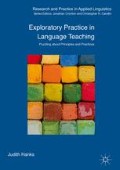Abstract
This chapter is about understanding for practice – if you want to try Exploratory Practice (EP) (and hopefully this book has convinced you that it is worth considering), what do you need to think about? How to access those elusive puzzles that fly around our brains? How to capture life ‘as it flies’?
Access this chapter
Tax calculation will be finalised at checkout
Purchases are for personal use only
References
Allwright, D. (1984). Why don’t learners learn what teachers teach? The interaction hypothesis. In D. Singleton & D. Little (Eds.), Language learning in formal and informal contexts (pp. 3–18). Dublin: IRAAL.
Allwright, D. (2006). Six promising directions in applied linguistics. In S. Gieve & I. K. Miller (Eds.), Understanding the language classroom (pp. 11–17). Basingstoke: Palgrave Macmillan.
Allwright, D., & Hanks, J. (2009). The developing language learner: An introduction to Exploratory Practice. Basingstoke: Palgrave Macmillan.
Bauman, Z. (2007). Liquid times. Cambridge: Polity Press.
Breen, M. P. (2006). Collegial development in ELT: The interface between global processes and local understandings. In S. Gieve & I. K. Miller (Eds.), Understanding the language classroom (pp. 200–225). Basingstoke: Palgrave Macmillan.
Burns, A. (1999). Collaborative action research for English language teachers. Cambridge: Cambridge University Press.
Candlin, C. N., & Crichton, J. (2013a). From ontology to methodology: Exploring the discursive landscape of trust. In C. N. Candlin & J. Crichton (Eds.), Discourses of trust (pp. 1–18). Basingstoke: Palgrave Macmillan.
Candlin, C. N., & Crichton, J. (2013b). Putting our trust in the learner. In J. Arnold & T. Murphey (Eds.), Meaningful action: Earl Stevick’s influence on language teaching (pp. 79–94). Cambridge: Cambridge University Press.
Cochran-Smith, M., & Lytle, S. L. (1999). The teacher research movement: A decade later. Educational Researcher, 28(7), 15–25.
Cortazzi, M., & Jin, L. (1996). Cultures of learning: Language classrooms in China. In H. Coleman (Ed.), Society and the language classroom (pp. 169–206). Cambridge: Cambridge University Press.
Dewey, J. (1963). Experience and education. New York: Collier Books.
Fairclough, N. (1989). Language and power. Harlow: Longman.
Flanagan, J. C. (1954). The critical incident technique. Psychological Bulletin, 51(4), 327–358.
Freire, P. (1973). Education for critical consciousness. New York: Seabury Press.
Furman, B., & Ahola, T. (1992). Pickpockets in a nudist camp: The systemic revolution in psychotherapy. London: Dulwich Centre Publications.
Gieve, S., & Miller, I. K. (2006b). What do we mean by ‘quality of classroom life’? In S. Gieve & I. K. Miller (Eds.), Understanding the language classroom (pp. 18–46). Basingstoke: Palgrave Macmillan.
Hanks, J. (1998). “The thing that puzzled me was…”: Implications of teacher perspectives on ‘problems’ and ‘puzzles’ for Exploratory Practice. Unpublished MA dissertation, Lancaster University.
Hanks, J. (2013a). Inclusivity and trust in Exploratory Practice: A case study of principles in practice. In E. Tarone & D. Soneson (Eds.), Expanding our horizons: Language teacher education in the 21st century. Minneapolis: CARLA.
Hanks, J. (2013b). Exploratory Practice in English for academic purposes: Puzzling over principles and practices. Unpublished PhD thesis, University of Leeds.
Hanks, J. (2015a). ‘Education is not just teaching’: Learner thoughts on Exploratory Practice. ELT Journal, 69(2), 117–128. First published online: December 1, 2014.
Hanks, J. (2015b). Language teachers making sense of Exploratory Practice. Language Teaching Research, 19(5), 612–633.
Kramsch, C. (2009). The multilingual subject. Oxford: Oxford University Press.
Lortie, D. C. (1975). Schoolteacher: A sociological study. Chicago: University of Chicago Press.
Lyra, I., Fish Braga, S., & Braga, W. (2003). What puzzles teachers in Rio de Janeiro, and what keeps them going? Language Teaching Research, 7(2), 143–162.
Miller, I. K. (2009). ‘Puzzle-driven’ language teacher development: The contribution of Exploratory Practice. In T. Yoshida, H. Imai, Y. Nakata, A. Tajino, O. Takeuchi, & K. Tamai (Eds.), Researching language teaching and learning: An integration of practice and theory (pp. 77–93). Bern: Peter Lang.
Scarino, A. (2010). Language and languages and the curriculum. In A. J. Liddicote & A. Scarino (Eds.) Languages in Australian Education: Problems, prospects and future directions (pp. 157–177). Newcastle upon Tyne: Cambridge Scholars Publishing.
Stake, R. E. (1995). The art of case study research. Thousand Oaks: Sage.
Wedell, M., & Malderez, A. (2013). Understanding language classroom contexts: The starting point for change. London: Bloomsbury Academic.
Wenger, E. (1998). Communities of practice: Learning, meaning, and identity. Cambridge: Cambridge University Press.
Zeichner, K. M., & Noffke, S. E. (2001). Practitioner research. In V. Richardson (Ed.), Handbook of research on teaching (4th ed., pp. 298–330). Washington, DC: American Educational Research Association.
Author information
Authors and Affiliations
Copyright information
© 2017 The Author(s)
About this chapter
Cite this chapter
Hanks, J. (2017). Puzzles, Puzzling, and Trust. In: Exploratory Practice in Language Teaching. Research and Practice in Applied Linguistics. Palgrave Macmillan, London. https://doi.org/10.1057/978-1-137-45344-0_12
Download citation
DOI: https://doi.org/10.1057/978-1-137-45344-0_12
Published:
Publisher Name: Palgrave Macmillan, London
Print ISBN: 978-1-137-45343-3
Online ISBN: 978-1-137-45344-0
eBook Packages: EducationEducation (R0)

